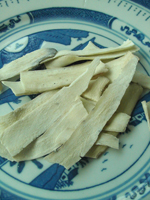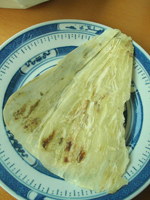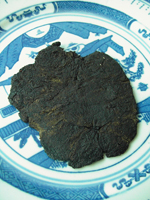|
Most women reach menopause between the ages of 45 and 55, however, the entire transition period can take 10 to 15 years. Because the hormonal changes are so erratic, a host of signs can appear and interfere with day-to-day life.
Menopause should be treated as a natural event, not a medical crisis. From a TCM perspective, menopause symptoms are the result of a disrupted balance between the internal organs, and therapies should be aimed to motivate the organs to shift into a new balance. The multiple components of herbal remedies can target the internal disharmony through different aspects of the body, such as various metabolic processes in the hypothalamus-pituitary-sex gland axis, and thus create a comprehensive regulating effect to maintain the stability of internal environment, ensure a slow, gentle and smooth hormonal transition.
Generally, TCM believes that principles like nourishing yin and tonifying kidney are essential to every treatment; when dealing with menopause symptoms, dispelling liver stagnation and reinforcing the spleen are important; while activating blood and qi (vital energy), as well as dissolving phlegm and stasis are necessary for complex conditions.
| Therapeutic principle |
Nourishing the kidney and liver, replenishing yin and essence |
| Indications |
Hot flashes, sweating, hot sensations in the body, dizziness, ear ringing, poor memory, lumbar and knee weakness, fatigue, mood swings, restless mind, skin itchiness, numbness or crawling sensations, mouth dryness, constipation, yellowish urine, menstrual irregularities, vaginal itchiness, and red tongue with little coating |
Commonly used ingredients
| gou qi chi |
Chinese wolfberry fruit |
Fructus Lycii |
| he shou wu |
tuber fleeceflower root |
Radix Polygoni Mulitflori |
| shan zhu yu |
cornus fruit |
Fructus Corni |
| sheng di |
rehmannia root |
Radix Rehmanniae |
| shu di |
processed rhemannia rhizome |
Rhizoma Rehmanniae Praeparatae |
| bai shao |
white peony root |
Radix Paeoniae Alba |
| Sample prescription: Linking Decoction |
| Therapeutic principle |
Warming and augmenting the kidney and spleen |
| Indications |
A dull facial complexion, lassitude, depressive mood, breath shortness, sensitive to low temperatures, lumbar soreness, limb coldness, loose bowels, abdominal distention, poor appetite, puffiness, poor control of urination or passing stools. There may also have excessive thin vaginal discharges, prolonged or heavy menses flow which is thin in nature, bulky, glossy and pale tongue |
Commonly used ingredients
| dang shen |
pilose asiabell root |
Radix Codonopsis Pilosulae |
| bai shu |
largehead atractylodes rhizome |
Rhizoma Atractylodis Macrocephalae |
| fu zi |
monkshood |
Radix Aconiti |
| rou gui |
cassia bark |
Cortex Cinnamomi |
| du zhong |
eucommia bark |
Cortex Eucommiae |
| tu si zi |
dodder seed |
Semen Cuscutae |
| Sample prescription: Aconite Pill for Regulating the Middle |
| Therapeutic principle |
Nourishing blood and yin, calming the heart and benefiting the spleen |
| Indications |
Dizziness, blurred vision, palpitations, poor memory, insomnia or dream-disturbed sleep, panic, lethargy, fatigue, breath shortness, pale complexion, hot flashes, pale and bulky tongue |
Commonly used ingredients
| ren shen |
ginseng |
Radix Ginseng |
| fu ling |
poria |
Poria |
| shan yao |
Chinese yam |
Rhizoma Dioscoreae |
| shi chang pu |
acorus |
Rhizoma acori tatarinowi |
| suan zao ren |
sour jujube seed |
Semen Ziziphi Spinosae |
| yuan zhi |
polygala poot |
Radix Polygalae |
| long yan rou |
longan aril |
Arillus Longan |
| Sample prescription: Sedative and Heart Invigorating Pill |
| Therapeutic principle |
Communicating the kidney and heart, nourishing yin and depressing virtual fire |
| Indications |
Palpitations, insomnia or dream-disturbed sleep, irritability, mood swings, poor memory, hot flashes, sweating, dizziness, ear ringing, lumbar and knee weakness, mouth dryness or mouth sores, scanty urine and red tongue |
Commonly used ingredients
| wu wei zi |
schisandra |
Fructus Schisandrae |
| niu xi |
achyranthes root |
Radix Achyranthis Bidentatae |
| zhi mu |
anemarrhena rhizome |
Rhizoma Anemarrhenae |
| tian dong |
cochinchinese asparagus root |
Radix Asparagi |
| sheng di |
rehmannia root |
Radix Rehmanniae |
| dan shen |
red sage root |
Radix Salviae Miltiorrhizae |
| Sample prescription: Communicating and Tranquilizing Pill |
| Therapeutic principle |
Dispelling liver stagnation, harmonizing spleen, and regulating qi |
| Indications |
Depression, irritability, easily angered, belching, sighing, chest discomfort, distending pain in the lower abdomen, poor appetite, loose bowels, menstrual irregularities or severe PMS syndromes, red or bulky tongue with coarse coating |
Commonly used ingredients
| chai hu |
bupleurum root |
Radix Bupleuri |
| dang gui |
angelica root |
Radix Angelicae Sinensis |
| fu ling |
poria |
Poria |
| bai shu |
largehead atractylodes rhizome |
Rhizoma Atractylodis Macrocephalae |
| bai shao |
white peony root |
Radix Paeoniae Alba |
| chen pi |
dried tangerine peel |
Pericarpium Citri Reticulatae |
| xiang fu |
nutgrass flatsedge rhizome |
Rhizoma Cyperi |
| Sample prescription: Free and Easy Wanderer Plus |
| Therapeutic principle |
Nourishing blood, enriching yin, preserving body fluids, and lubricating |
| Indications |
Emotional or mental disorders such as anxiety, depression, and paranoia; insomnia, yawning, restless, palpitations, lassitude, constipation, a pale tongue with coarse coating |
Commonly used ingredients
| sheng di |
rehmannia root |
Radix Rehmanniae |
| gan cao |
liquorice root |
Radix Glycyrrhizae |
| fu xiao mai |
shriveled wheat |
Fructus Tritici Levis |
| da zao |
common jujube fruit |
Fructus Ziziphi Jujubae |
| bai he |
lily bulb |
Bulbus Lilii |
| wu wei zi |
schisandra |
Fructus Schisandrae |
| dang gui |
angelica root |
Radix Angelicae Sinensis |
| Sample prescription: Lily Bulb and Rehmannia Decoction |
| Therapeutic principle |
Reinforcing yang and replenishing yin |
| Indications |
Alternating hot flashes and chills, red cheeks, weakness, lumbar soreness, palpitations, excessive sweating, dizziness, ear ringing, hot sensations in the palms and soles, insomnia, paleness, fatigue, poor appetite, urinary dripping, low libido and menstrual irregularities, pale tongue |
Commonly used ingredients
| xian ling pi |
epimedium |
Herba Epimedii |
| ba ji tian |
morinda root |
Radix Morindae Officinalis |
| Xian mao |
common curculigo rhizome |
Rhizoma Curculiginis |
| mo han lian |
yerbadetajo herb |
Herba Ecliptae |
| nu zhen zhi |
glossy privet fruit |
Fructus Ligustri Lucidi |
| rou cong rong |
cistanche |
Herba Cistanchis |
| shu di |
processed rhemannia rhizome |
Rhizoma Rehmanniae Praeparatae |
| Sample prescription: Promoting Yin and Yang Decoction |
| Therapeutic principle |
Invigorating kidney, regulating extra meridians |
| Indications |
Irregular periods, absentmindedness, fatigue, lumbar and knee soreness, discomfort in the lower abdomen, limb coldness, poor appetite, irritability, dizziness, ear ringing, occasional hot flashes, pale or bulky tongue |
Commonly used ingredients
| tu si zi |
dodder seed |
Semen Cuscutae |
| rou gui |
cassia bark |
Cortex Cinnamomi |
| xu duan |
himalayan teasel root |
Radix Dipsaci |
| bai shao |
white peony root |
Radix Paeoniae Alba |
| lu jiao jiao |
Deer antler glue |
Colla Cornus Cervi |
| shan yu rou |
cornus fruit |
Fructus Corni |
| Sample prescription: Consolidating Thoroughfare Vessel Decoction |
| Therapeutic principle |
Resolving stagnation and phlegm, promoting qi circulation |
| Indications |
Mood swings, depression, anxiety or paranoia, sleeping difficulties, chest tightness, suffocating sensation in the throat, excessive throat secretion, obesity, weakness, belching and abdominal distention, bulky pale tongue with white greasy coating |
Commonly used ingredients
| chen pi |
dried tangerine peel |
Pericarpium Citri Reticulatae |
| ban xia |
pinellia tuber |
Rhizoma Pinelliae |
| fu ling |
poria |
Poria |
| zhi shi |
immature bitter orange |
Fructus Aurantii Immaturus |
| hou po |
magnolia bark |
Cortex Magnoliae Officinalis |
| ku xing ren |
bitter apricot kernel |
Semen Armeniacae Amarum |
| Sample prescription: Four Herbs Decoction for Clearing Stagnation |
| Therapeutic principle |
Activating blood, dissolving stasis, and removing meridian obstructions |
| Indications |
Slow mental response, anxiety, headache, chest oppression, pain in the chest or abdomen, dull complexion, general aching, insomnia or sleepiness, itchiness, limb numbness or joint stiffness, dark tongue/tongue with purplish spots |
Commonly used ingredients
| chuan xiong |
Sichuan lovage |
Rhizoma Ligustici Chuanxiong |
| dan shen |
red sage root |
Radix Salviae Miltiorrhizae |
| shao yao |
peony |
Radix Paeoniae |
| tao ren |
peach kernel |
Semen Persicae |
| hong hua |
safflower |
Flos Carthami |
| dang gui |
angelica root |
Radix Angelicae Sinensis |
| Sample prescription: Unblock the Orifices and Invigorate the Blood Decoction |
Because of the wide variety of menopause symptoms, some herbs are added for relieving specific serious complaints. For example:
Excessive sweating or vaginal discharge
| long gu |
fossil bone |
Os Draconis |
| mu li |
oyster shell |
Concha Ostreae |
Sleeping difficulties
| ye jiao teng |
tuber fleeceflower stem |
Caulis Polygoni Multiflori |
| he huan pi |
mimosa tree bark |
Cortex Albiziae |
uneasy mind
| long chi |
fossil teech |
Dens Draconis |
| hu po |
amber |
Succinum |
Severe body heat
| huang qin |
baical skullcap root |
Radix Scutellariae |
| huang lian |
golden thread rhizome |
Rhizoma Coptidis |
Hot sensation in the palms and soles
| di gu pi |
wolfberry root-bark |
Lycii Radicis Cortex |
| bai wei |
blackend swallowwort root |
Radix Cynanchi Atrati |
Diarrhea or loose bowels
| bu gu zhi |
psoralea |
Fructus Psoraleae |
| rou dou kou |
nutmeg |
Semen Myristicae |
Skin itchiness
| chan tui |
cicada slough |
Periostracum Cicadae |
| bai xian pi |
dictamnus root bark |
Cortex Dictamni Dasycarpi Radicis |
Heavy menses
| bu gu zhi |
psoralea |
Fructus Psoraleae |
| ai ye tan |
artemisia leaf (charred) |
Folium Artemisiae Argyi |
Night urination
| yi zhi ren |
sharpleaf glangal fruit |
Fructus Alpinae Oxyphylae |
| sang piao shao |
mantis egg-case |
Os Sepiellae Seu Sepiae |
Dizziness and headache
| tian ma |
tall gastrodia tuber |
Rhizoma Gastrodiae |
| gou teng |
gambir vine stem |
Ramulus Uncariae cum Uncis |
Rich in clinical experience, TCM has formulated many herbal prescriptions for various health problems in women. Among those prescriptions for menopause, herbs for dispelling liver and regulating reproductive system such as white peony root, angelica root, rehmannia root and bupleurum root are the ones most selected; herbs for invigorating kidney such as epimedium and common curculigo rhizome are the second most popular choices, which help reinforce overall endocrine activities; herbs for invigorating the spleen such as largehead atractylodes rhizome, poria and liquorice root are also useful and can ensure material transformation. Other popular selections include herbs for suppressing hot flushes, such as anemarrhena rhizome and rehmannia root; herbs for nourishing heart and calming the spirit, include sour jujube seed, Chinese arborvitae kernel and polygala poot; abalone shell, nacre and oyster shell are for soothing the liver which helps stabilize the cardiovascular and neural functions.
Although TCM herbal remedies have not undergone full clinical trials, experiences over the centuries have testified to their efficacy. Nevertheless, herbs should be used cautiously, as they may contain potent ingredients that can cause a variety of harmful reactions, including diarrhea, allergic reactions and sometimes hallucinations. Always use herbs in moderation and under the guidance of professionals.
 |
|
 |
|
 |
White peony root |
|
Angelica root |
|
Rehmannia root |
|